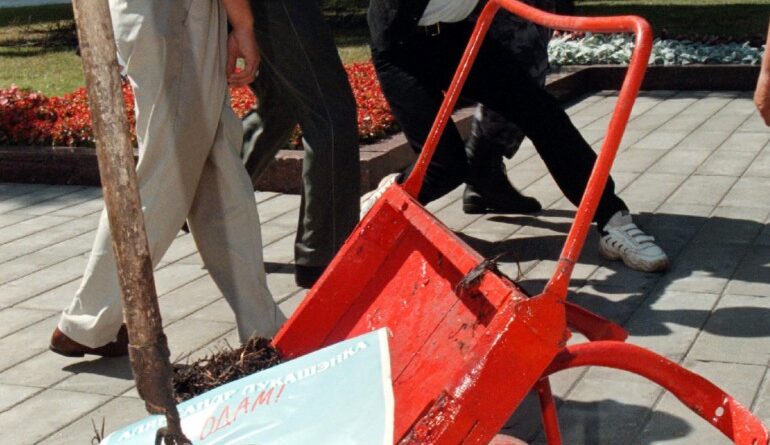
Artist and political activist Ales Pushkin, 57, has died in prison in what his wife said were “unclear circumstances”.
A Belarusian artist who once dumped manure outside the office of President Alexander Lukashenko has died in prison where he was serving a five-year sentence for his political activities, human rights activists and his wife said.
Ales Pushkin, 57, died on Tuesday in a prison in Grodno, western Belarus, of unknown causes, although he was not known to have been ill, according to the human rights center Viasna.
Pushkin’s wife, Janina Demuch, told The Associated Press that the artist had “died in the prison’s intensive care unit under unclear circumstances.”
There was no comment from the Belarusian authorities.
😭The artist and political prisoner Ales Pushkin died in intensive care under unclear circumstances. His wife wrote about it on Facebook.
He had been a friend of the head of Viasna Ales Bialiatski for many years. pic.twitter.com/jziNJcHGBh
— #FreeViasna (@FreeViasna) July 11, 2023
Pushkin was a political performer and drawing the theme was often Lukashenko, the country’s authoritarian leader. The artist painted Lukashenko in hell, surrounded by riot police, in a fresco in a church in the Belarusian city of Bobr.
In 1999, Pushkin was sentenced to two years for “Dung for the President”, in which he overturned a dung cart at the entrance to the presidential office in the capital, Minsk.
Militiamen try to remove Ales Pushkin after he brought a cartload of dung to the administration of Belarusian President Alexander Lukashenko in Minsk in 1999. [File: VF/WAW via Reuters]
Pushkin actively participated in the protests of the political opposition.
In March 2021 he was arrested and sentenced to five years in prison for incitement to hatred and “desecration of state symbols”. Supposedly, in one of his exhibitions, Pushkin painted a Belarusian nationalist, a member of the post-war anti-Soviet resistance, who had collaborated with the Nazis during World War II.
At the sentencing hearing, Pushkin stripped in protest, for which he was placed in solitary confinement for 13 days.
Belarus was gripped by massive protests when Lukashenko was re-elected in August 2020 in a vote that the opposition and the West denounced as a sham.
The authorities responded with a brutal crackdown that led to the arrest of more than 35,000 people, police beatings and the closure of many non-governmental organizations and independent media.
According to Viasna, Belarus has imprisoned nearly 1,500 political prisoners, including Nobel Peace Prize winner Ales Bialiatski.
Exiled Belarusian opposition leader Sviatlana Tsikhanouskaya said Belarus has lost one of its “most talented” and “brave sons” with the death of Pushkin, who “died a political prisoner of the regime”, from for which Lukashenko and “his colleagues” assumed responsibility.
“Ales used his art to fight for freedom and build a new Belarus without tyranny. He dreamed of a free and democratic Belarus. Now we must continue his work and make his dream come true,” Tsikhanouskaya wrote on Twitter.
“Dictators fear artists,” he said.
Belarus has lost one of its most talented and fearless sons. Ales Pushkin was the embodiment of the indomitable spirit of the Belarusian people. He died as a political prisoner of the regime and the responsibility lies with his jailer, Lukashenka and his comrades.
Ales used his art to… pic.twitter.com/lIRaQ0taI4
— Sviatlana Tsikhanouskaya (@Tsihanouskaya) July 11, 2023
“They hold up a mirror to the world, a mirror that tyrants fear to look into. I hope this tragedy is a wake-up call to the world. How many more people must die behind bars?” she added.
“I call for a strong international reaction to this death and the inhumane treatment of political prisoners.”
Lukashenko’s regime, reclusive for years, has become further isolated after brutally cracking down on protests and allowing Russia to use Belarusian territory to launch its offensive in Ukraine.
[ad_2]
Source link





